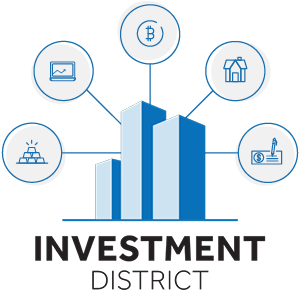The following was written by guest blogger John Sarson of Sarson Funds.
When cryptocurrency comes to mind, most people think of Bitcoin and Ethereum. They think of speculative risk and have limited knowledge of what Bitcoin or Ethereum are and why they matter.
Let’s start your digital asset education by dispelling some myths. Digital assets are not magical digital money. They are not always speculative bubbles or risky assets.
The simple truth is that cryptocurrencies and digital assets are an emergent asset class that fits well in the alternative asset portfolio allocation for an educated investor.
Digital assets serve an increasing number of real-world use cases beyond functioning as digital money and stores of value. As more use cases are adopted, it is becoming clear that a diversified investment portfolio should include digital assets as part of a well-balanced allocation.
Blockchain technology
The foundational technology of the most popular digital assets known as cryptocurrencies is the blockchain. A blockchain is a distributed and independently verifiable ledger system. Put another way, a blockchain is a type of software-based accounting system that is operated by many people, using a large network of computing power.
Anyone can contribute to the blockchain network from their personal computer from anywhere in the world. The ledger system provides transparency and accountability for any transaction that takes place on the network. The network data is publicly available for anyone to audit. Since the blockchain is a distributed and verifiable ledger, it reduces the need for centralized third-party transaction verification such as banks or escrow services.
Examples of digital assets and how they are creating real-world value
Digital assets have a growing number of real-world use cases and are no longer limited to currency-related transactions. Here are some common examples:
Digital Cash – Digital cash disrupts online banking by using digital assets as both payments and digital wallets to conduct transactions. All transactions are verified on a distributed ledger and can be conducted by mobile devices. Examples: Telcoin (TEL), Metal (MTL), Celo (CELO), (Terra) LUNA.
Store of Value – Cryptocurrencies can become less volatile as more people adopt them and networks grow. For example, Bitcoin continues to align its value over time, aligning with gold and interest-bearing assets as a hedge to protect against hyperinflation. Examples: Bitcoin (BTC), Bitcoin Cash (BCH).
International Wire Transfers – “Ripple” is a real-time gross settlement system not subjected to any waiting period that upon adoption can replace ACH and wire. Examples: Ripple (XRP), Stellar (XLM).
Decentralized Finance – Blockchain technology allows the permissionless delivery of financial services and products, such as lending markets and exchanges. Examples: Celsius (CEL), Bancor (BNT), Uniswap (UNI), Yearn (YFI), Aave (AAVE).
Art, Collectibles, Media – Non-fungible tokens (NFTs) enable alternative media revenue models, digital collectibles, and new distribution and licensing avenues for artists. Examples: MEME, NFT Index Fund (NFTX).
Decentralized Data Provision – Blockchain enables new data infrastructure, allowing for decentralized data markets and new ways to provide data. Examples: Chainlink (LINK), Polkadot (DOT), Kylinl (KYL).
Video and Gaming – Blockchain allows for new types of games, decentralized video streaming, and in-game economics. Examples: Theta (THETA), Enjin Coin (ENJ).
Supply Chain Management – Hedera Hashgraph is being used to digitize infrastructure in the freight industry, and other platforms are contributing to supply chain integrity and QA. Examples: Hedera Hashgraph (HBAR), VeChain (VET).
Internet-of-Things Transactions – IOTA’s official partnerships with Audi, BMW, Porsche, and VW will create microtransactions to pay autonomously for parking, charging their batteries, tolls, and all services. Examples: Iota (IOTA), Helium (HNT).
Ways to invest in digital assets
Grayscale Bitcoin Trust (GBTC) – GBTC is a grantor trust that trades on public markets like a stock. Investors can gain exposure to crypto through owning GBTC or a similar exchange-traded product.
Passive Index Products – Some managers have developed passive index products that can provide targeted exposure to various sectors of cryptocurrencies.
Exchange Traded Funds (ETF) – ETFs allow investors to gain passively managed exposure to underlying assets. While the launch of crypto ETFs has lagged in the US, several have launched in Canada.
Market Proxies – A growing number of publicly traded companies hold a portion of their treasuries in bitcoin or other cryptocurrencies. Equity market exposure to these companies can provide a proxy to the cryptocurrencies in the treasuries.
Mining – Many cryptocurrencies incentivize good actors to secure and maintain the network by emitting a new supply of tokens with each new block. This process of “mining” can be a way for investors to gain low-risk exposure.
Managed Funds – Managed funds, such as Sarson Funds, provide targeted and risk-managed exposure to cryptocurrencies under various strategies.
Buy Spot on Exchange –Users can access exchanges to purchase crypto using a computer or mobile device.
Active investing
Many investors opt to use active managers and investment professionals with direct cryptocurrency experience, such as Sarson Funds. Active managers can offer deeper analysis, stronger access to information, and an earlier look at emerging opportunities. Active managers can also take sophisticated approaches to risk management, pairing crypto-specific knowledge with traditional risk management techniques.
Given that crypto currently lacks an industry-standard Bloomberg equivalent, experienced active managers source data and insights like no other market. Active managers deploy funds under pre-specified strategies, allowing investors to choose which strategy is most appropriate for their investment goals.
Active managers architect investment strategies with tax implications in mind, simplify the reporting and tax process, provide performance statements in regular intervals, and furnish tax documents each year.
The downside to active funds is that the fees are higher than passive funds, and they typically expose investors to different types of nuanced risk.
The bottom line: blockchain and cryptocurrencies are nuanced areas for investment. Active managers can simplify the investment process for those without the appetite to navigate the space on their own.
Passive investing
Investors restrict their actions by opting for buy and hold strategies in passive management styles. This is a long-term investment strategy that is agnostic to near-term price movements and can be a cost-effective way to invest.
The upside of passive strategies is lower fees, greater transparency, and tax efficiency. However, because crypto is still a nascent asset class, it can place a higher burden on individual investors to educate themselves on the nuanced aspects of digital assets and investment risk. Passive investments are also limited in the types of exposure provided and can limit potential upside.
About John Sarson
John Sarson is CEO and Cofounder of Sarson Funds, an independent provider of blockchain technology and cryptocurrency marketing and educational services focusing on the financial professional community and their clients. John brings over 15 years of Wall Street wholesale investment sales leadership experience, with successful tenures at firms like Guggenheim & Lord Abbott. He founded a registered investment advisory in 2016 prior to founding Sarson Funds and is a graduate of the University of Notre Dame.
—







